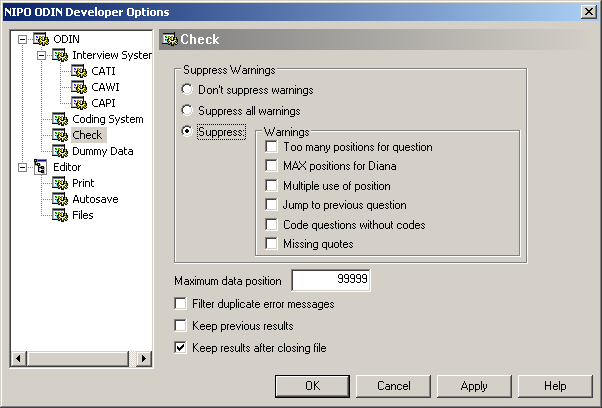NIPO ODIN Version 5.17
Check Options
The Check options configure various options with regard to a syntax check of the questionnaire.
NIPO ODIN Developer Check Options

Suppress Warnings
Syntax check warnings are issues within the script that may lead to unwanted script behavior and data storage, but do not prevent execution of the questionnaire. You can select any of the following three settings:
Don't suppress warnings
All warnings are listed in the syntax check log.
Suppress all warnings
None of the warnings are listed in the syntax check log.
Suppress
Select which warning types must be suppressed:
- Too many positions for question. The length definition of a
*CODES question reserves more space than required to store the answer codes. This may sometimes be the case for any question where *MULTI was accidentally omitted. - MAX positions for Diana. Only relevant if NIPO Diana is used for reporting. Any questionnaire that uses more than NIPO Diana's default limit (8,000 positions) generates this warning. Note that NIPO Diana may be configured to use up to 32,000 positions.
- Multiple use of position. There is more than one attempt to store data in one or more positions. This potentially may overwrite previously stored information within the same interview. This warning is ignored for positions in a
*DUMMY question. - Jump to previous question. Using a
*GOTO to jump back in the questionnaire can potentially lead to loss of data and endless loops. It is recommended to use *BACK if appropriate. - Code question without codes. If a
*CODES question does not have any codes, it is always skipped. This warning is ignored for *CODES questions in combination with *DUMMY. - Missing quotes. A
*PUT is used to store a text in a text variable where the opening quote does not have a matching closing quote.
Maximum data position
The maximum data position can be used to impose data size limits for your statistical analysis software. Exceeding this limit generates a warning during a syntax check.
Filter duplicate error messages
Prevents the syntax check from listing warnings and errors more than once for a single check. For example, in case of multiple use of a position, not every occurrence is listed.
Keep previous results
The syntax check log file is not cleared upon the next syntax check; instead, a new window is opened so that results may be compared.
Keep results after closing file
If the questionnaire file is closed, the syntax check log file is not closed.
|
